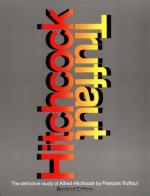
|
| Name: _________________________ | Period: ___________________ |
This test consists of 5 multiple choice questions, 5 short answer questions, and 10 short essay questions.
Multiple Choice Questions
1. What was the title of Hitchcock's first official film?
(a) 'The Outlaw.'
(b) 'The Lodger'.
(c) 'The Temp'.
(d) 'The Seductress.'
2. Why did Hitchcock say he agreed to make "Mr. and Mrs. Smith"?
(a) To broaden his range.
(b) For the technical challenge it offered.
(c) For the paycheck.
(d) As a gesture of friendship.
3. What genre was Hitchcock's film "Mr. and Mrs. Smith"?
(a) Action.
(b) Period romance.
(c) Comedy.
(d) Science fiction.
4. What did Truffaut say about the success of "The Man Who Knew Too Much" in Britain?
(a) It was Hitchcock's greatest success in Britain.
(b) It was undeserved.
(c) It was a surprise.
(d) It was only successful due to the lack of competition at the theaters.
5. What did Hitchcock say does not make or break a movie?
(a) The critics' opinions.
(b) The box office returns.
(c) The ending.
(d) The cast.
Short Answer Questions
1. Why was Truffaut an outstanding choice for interviewing Hitchcock?
2. What did cameramen use in order to hide a leading lady's aging?
3. What incident was the ending of "The Man Who Knew Too Much" based on?
4. What is Hitchcock known as?
5. How was Hitchcock's first American film received in Britain?
Short Essay Questions
1. What schools did Hitchcock attend in his youth?
2. What was the ending of "The Man Who Knew Too Much" based on?
3. From where does the term "MacGuffin" originate?
4. How did it come about that Hitchcock made appearances in each of his films?
5. What did Hitchcock say about movie endings?
6. At the film studio, Hitchcock produced caption cards for films. What was the purpose of caption cards?
7. When was Hitchcock occasionally allowed to step behind the camera at Paramount Famous Players-Lasky?
8. In a short story, how did Hitchcock himself explain the term "MacGuffin"?
9. Describe the troubles Hitchcock had while filming his directorial debut.
10. What did Hitchcock and Truffaut discuss about movie critics?
|
This section contains 917 words (approx. 4 pages at 300 words per page) |

|




